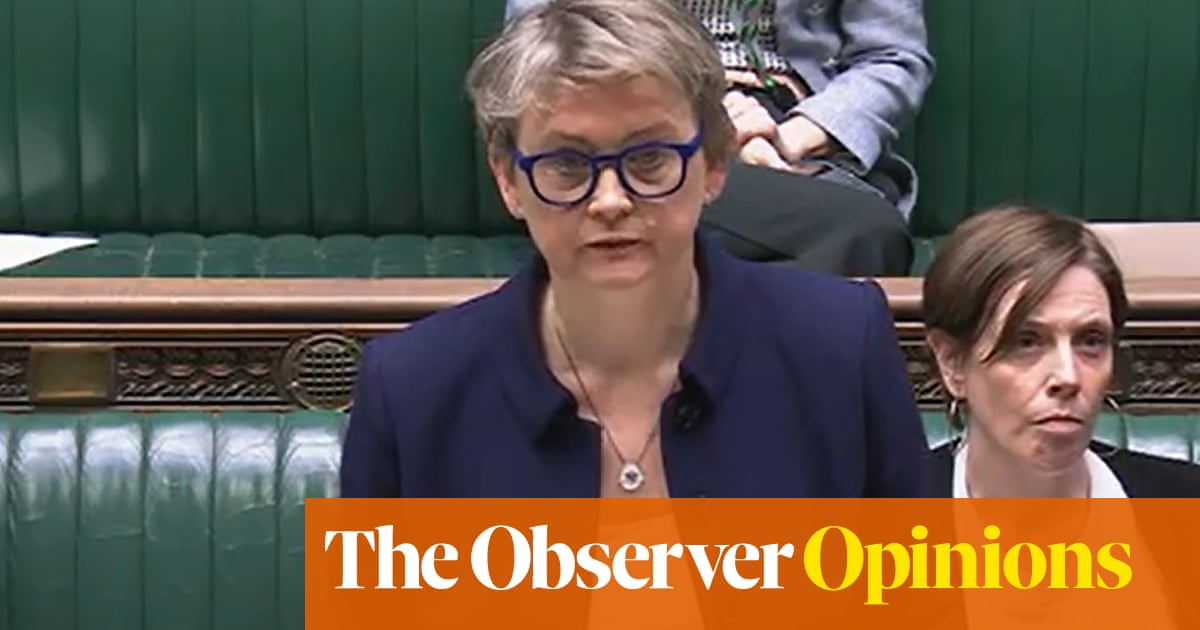Life moves slow until, suddenly, it doesn’t. The last time MPs voted on assisted dying was in 2015, with the next decade marked by near silence on the issue, as Brexit and austerity dominated the agenda. On Friday, a mere 18 days after the legislation was first published, MPs will vote on the landmark terminally ill adults (end of life) bill that could, in time, see the right to die become law in England and Wales.
None of this will feel fast enough for the late-stage cancer patients waiting for the autonomy to die as they choose, of course, not least those for whom it has come too late to end their suffering, or the loved ones who had to helplessly watch. And yet by any other definition, it is hard to escape the sense that the bill has been rushed. Britain’s longest-serving MPs, Labour’s Diane Abbott and the Conservative Sir Edward Leigh, last week issued a joint warning arguing that MPs have not had sufficient time to scrutinise the proposed law.
That the legislation is a private member’s bill, rather than having been drawn up by government lawyers, has only added to concerns that it may not be watertight. Sky News reported that there will be no impact assessment unless the bill passes second reading, nor any information on whether the private sector would also carry out the end-of-life service. Some disgruntled MPs are said to feel that they are being asked to vote without all the facts.
If you are in favour of the law change, it’s likely that all this sounds frustrating. If you are against it, it probably confirms your fears. The hurry of the latest bill has exacerbated what has long been the problem with an issue as emotionally charged as assisted dying: proponents and critics are often fixed in their stance, with too many of us struggling to have an open mind or even respect the alternative viewpoint as legitimate.
We saw this when the proposer of the bill, Kim Leadbeater MP, recently posted an article on X by a supporter dying from cancer and remarked: “Who is anyone else to deny him & other terminally ill people the choice they are asking for?” The implication, however unintentional, was that those wary of the legislation are overbearing rather than people who have valid reservations.
On the other hand, the health secretary, Wes Streeting – who has said he will vote against the bill – has been criticised for commissioning an investigation into the cost of assisted dying and suggesting some other NHS services would have to be cut to pay for it. Meanwhile, the justice secretary, Shabana Mahmood, has warned the bill would mean heading for “death on demand”.
Politics is built on definitives. Politicians are rarely rewarded for nuanced positions by either the public or press, just as – by definition of trying to win a vote – MPs and campaigners are encouraged to present their “side” as the rational and virtuous one, and the other as irrational and prejudiced. That the assisted dying bill is dubbed “a matter of conscience” has only encouraged this simplistic binary: some people are right, some people are wrong, and there is a clear-cut moral answer if only you want to find it.
This is hardly a new phenomenon in politics, but its shortcomings become particularly apparent on a subject that is a literal question of life and death, not least one that is being pushed through at speed. Well-meaning terminally ill celebrities, such as Esther Ranzen, becoming the “faces” of the pro-campaign – when evidence suggests those most at risk if assisted dying is legalised are vulnerable minorities – has only added to the concern that the deeper issues are being glossed over.
Notably, Leadbeater has said that the bill – which will only apply to terminally ill people who are expected to die within six months – contains “the strictest protection and safeguard of any legislation anywhere in the world”, including requiring approval from two doctors and a high court judge, and lengthy prison sentences for coercion. That more than 3,400 healthcare professionals have nonetheless warned that inadequate NHS and hospice care could coerce patients into an assisted death shows how one event can look very different depending on the angle from which it is viewed.
For every claim that no person worried they are “a burden” to either their family or the NHS will feel obliged to hasten their end, there are charities and campaigners who believe otherwise. Similarly, for every country or area critics can point to that has seen a “slippery slope” widen the criteria of those eligible for an assisted death (see Canada), supporters can point to one that has not (see Oregon, US, although even this is disputed
Here is the thing we are not meant to say: no one can know for sure what will happen if assisted dying is legalised in the UK, and that includes newspaper columnists. At most, we can enter this debate with eyes wide open. This means weighing up evidence not only from other nations but also from our own societal conditions, including strained NHS and social care systems and rising intergenerational inequality. That those with lifelong good health and resources may feel protected by the arms of the state does not mean that those without will not feel oppressed.
An informed debate requires admitting that, even with the best end of life care, some people will still die in brutal pain. Equally, it means accepting that legalising assisted dying may affect more than the individual choosing death – it could alter attitudes towards the lives of elderly, disabled and ill people too. This week, one patron of Dignity in Dying, AC Grayling, argued for the right to help someone to die if they struggle with being “wheelchair bound”. If that escalation seems far fetched, we need only look to where public opinion already is: a YouGov poll last week found 55% say that assisted dying should be legal for patients with incurable conditions that are painful and/or debilitating but not terminal.
Just as Westminster politics do not reward nuance, neither do they encourage long-term change. No voter wants to hear that things will get better in a decade. And yet as MPs are given just over a fortnight to decide on one way to end terminally ill people’s suffering, perhaps they should also pledge to spend years on others – namely, funding a comprehensive palliative care system, including specialist pain relief, as well as greater access to social care and disability benefits.
Whatever the result on Friday, each of us would surely be best served by finding common ground. The truth is, there are no goodies or baddies here. There are just human beings – some of them in pain, scared or angry – trying to do right by themselves, their loved ones and their community. Life is not easy. It is messy – a flawed and blind pursuit to do our best amid the darkness and the doubt. There is no reason we should expect matters of death to be any different.
-
Frances Ryan is a Guardian columnist

.png) 1 month ago
17
1 month ago
17













































